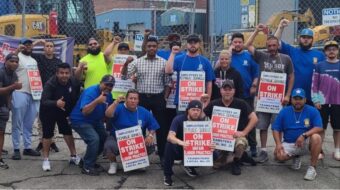
The Supreme Court this week halted history’s biggest ever job discrimination lawsuit, filed by a group of women against Wal-Mart, on the grounds that the class action against the retail monster, potentially involving 1.6 million workers, was too large.
The court said, essentially, that since Wal-Mart may have discriminated against hundreds of thousands, as opposed to just a few women, the company cannot be held to account for its lawlessness.
The ruling is a severe blow to working Americans who have looked to the courts for protection in their struggle for fair treatment in the workplace.
Ever since passage of the Civil Rights Act in 1964 workers have united to fight discrimination on the job through class action proceedings. Such proceedings have provided one of the best means of ensuring that employers obey the nation’s civil rights laws.
By ruling that the Wal-Mart women have no right to appeal for justice as a class, the court told Wal-Mart it has nothing to worry about when it violates those laws.
The United Food and Commercial Workers, in its amicus brief to the Supreme Court, said a class action process open to workers, regardless of the size of the company or the size of the class fighting the company, is a fundamental pillar of the Civil Rights Act. We agree.
The conservative majority on the Supreme Court has once again signaled that when it comes to big business vs. civil society and democracy, it will protect corporations rather than ordinary citizens and workers. The Wal-Mart ruling comes from a High Court which only a year ago, in its notorious Citizens United ruling, freed Wal-Mart and all the other big corporations to spend as they choose to buy elections.
But the women of Wal-Mart and the rest of America’s workers are fighting back.
Already, fair pay activists are rallying in several cities against the ruling and calling for passage of the Paycheck Fairness Act, the bill that would give workers the tools they need to close the wage gap between men and women.
Unions are redoubling their efforts to organize workers at the nation’s retail giants. They seek to end a situation in which one-third of the women working at Wal-Mart and other mega-chains are forced to enroll for public assistance because of the poverty wages they are paid. Women in unions earn, on average, $2 an hour more than their non-union counterparts at Wal-Mart.
As we see workers across this land fighting for their right to bargain collectively, the Supreme Court’s wrong-headed ruling is a reminder that court battles and legislative battles are only part of the struggle. The grassroots organizing drive at Wal-Mart by the UFCW and the organizing efforts by many other unions all over this country deserve the support of everyone who cares about justice and democracy.
Photo: Lone Primate CC 2.0










